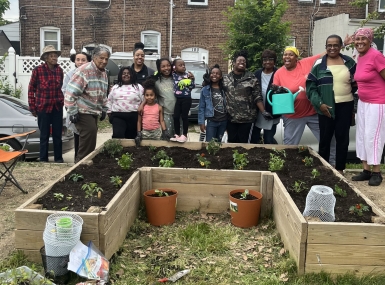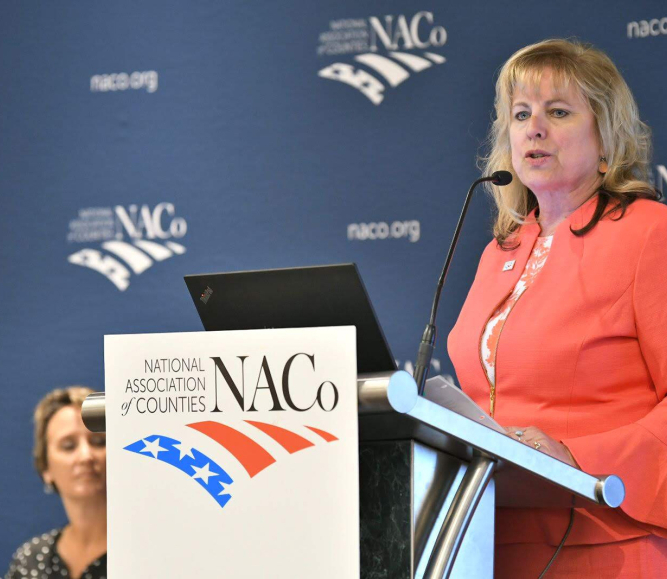NACo releases action guide for counties to support family caregivers
Author
Upcoming Events
Related News

Key Takeaways
According to the U.S. Census Bureau, nearly a quarter of the U.S. population is projected to be over the age of 65 by 2060. The nation’s population is rapidly aging, and counties are meeting increased demand for comprehensive care for older residents and caregivers.
In the summer of 2023, NACo conducted a survey of county leaders to learn more about the delivery of aging services and support available to caregivers. NACo partnered with the National Academy for State Health Policy, The John A. Hartford Foundation and the U.S. Administration for Community Living to develop The National Strategy to Support Family Caregivers: Action Guide for Counties. This guide highlights those survey findings, discusses challenges and opportunities for counties and provides key strategies and recommendations. The guide aims to help counties raise public awareness and improve service delivery for aging adults and their caregivers.
Learn more
Join NACo and the National Academy for State Health Policy from 1-2 p.m. ET March 18 to learn more about the new Action Guide for counties, how counties can leverage the National Strategy to Support Family Caregivers and innovative programs at the local level to support family caregivers
Caregiving comes in many forms and can be informal or formal. Informal caregivers are spouses, partners, family members, friends, or neighbors who provide unpaid assistance to help people with their daily activities or medical conditions. Formal caregivers provide paid care in the home or in a care facility (e.g., daycare, residential facility, long-term care facility).
Informal caregivers provide care every day to the growing aging population in communities across the nation. These caregivers fill gaps in the direct care workforce and allow older adults to age in place, instead of nursing homes and other congregate settings.
NACo’s survey found that of 44 respondents, 70% said their county provides support services to both informal and formal caregivers. This support includes services like respite care or adult day care, counseling and peer support groups, education and nutrition supports, housing and transportation needs, and more.
One example of this type of support is Mecklenburg County, N.C.’s Project C.A.R.E (Caregiver Alternatives to Running on Empty). Project C.A.R.E. provides a variety of services that support caregivers for family members, friends, or others with Alzheimer’s or related dementia.
The program provides social worker home-visits, information referrals and education, and connections to community-based services and resources. Further, the program provides reimbursement for respite care up to $500 (with opportunity for three vouchers) and three months of short-term respite coverage.
Project C.A.R.E also refers caregivers out to the county’s Department of Social Services’ Family Caregiver Support Program. This opportunity helps family caregivers make their roles more manageable by providing additional referrals, education and funding, and supplemental services. These services can include home modifications, nutritional supplements, and adaptive equipment.
Mecklenburg County is one of many counties taking on this work to build out services and systems that promote the wellbeing, safety, and security of informal and family caregivers. This work is critical for caregivers to continue providing quality care to the older adults in their lives.
NACo’s Action Guide is a part of a broader effort to implement the National Strategy to Support Family Caregivers and engage county leaders in this work.
The National Strategy, released in 2022, was created to support family caregivers and provide specific actions for federal, state and local governments, businesses, and other stakeholders. County leaders are using the strategy to raise awareness, advance partnerships and engagement, and improve the supportive services they provide. For additional information and publications related to the National Strategy to Support Family Caregivers please visit: https://supportcaregiving.org/
Related News

Casey Foundation emphasizes support for youth
“When youth are asked what helped them the most, they might name a program, but they will absolutely name a person that believed in them,” Leslie Boissiere told the General Session audience.

Maryland county invests in community ‘villages’
Baltimore County, Md. created a volunteer network or “village” to help with everything from groceries to doctor’s appointment to fighting isolation.

U.S. Congress passes reconciliation bill: What it means for counties
On July 3, the U.S. Congress passed sweeping budget reconciliation legislation.
County News
Counties can help elderly populations

